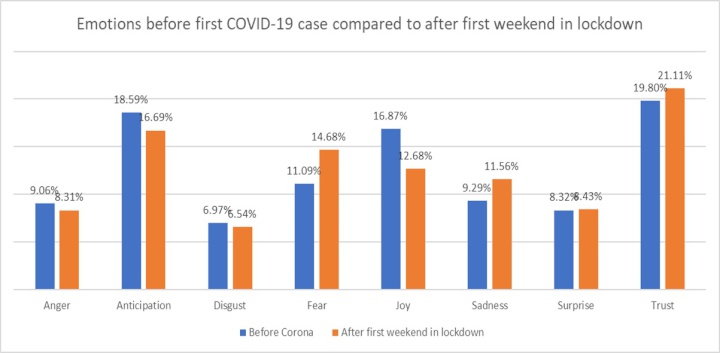Gross National Happiness Index Shows True Mood of Country
Gross National Happiness Index Shows True Mood of
Country During Covid-19 Crisis
In the
face of unprecedented measures to contain COVID-19, concerns
for the well-being of our fellow countrymen and women should
be skyrocketing.
But are they?
Real-time research by AUT wellbeing economist Stephanie Rossouw and Talita Greyling of the University of Johannesburg shows that until recently, Kiwis and Aussies were more affected by the death of basketballer Kobe Bryant rather than the threat of COVID-19.
Rossouw and Greyling, in collaboration with Afstereo, have created the “Gross National Happiness Index” (GNH) in order to provide empirical evidence about the state of a country’s overall ‘mood’ (also known as “affect happiness”). The data is based on real-time tweets, which are analysed to determine the sentiment of each tweet, deriving sentiment scores and then applying an algorithm to construct the Happiness Index. The index is measured on a scale from 0 (unhappy) to 10 (very happy), with 5 being neutral, neither happy nor unhappy.
The findings offer a glimpse into the true mood of the nation, which may be different from what we might be encouraged or expected to feel.
For example, even after New Zealand had its first confirmed case of COVID-19, the seriousness of the event did not fully reflect in the Happiness Index. Rather, the death of US basketball star Kobe Bryant on 27 January created the greatest fall in the happiness index. It was only when the second case was confirmed that our GNH reflected our drop in happiness. After that initial shock, however, we saw a marginal recovery in the Index, a trend that is common in the wake of a psychological or economic shock.
Recently the team expanded their research and also started analysing the emotions captured in each tweet, they differentiate between eight emotions: joy, anger, trust, anticipation, anger, fear, sadness and surprise. In addition to a drop in happiness, they found the overarching emotion to be that of trust. In times of global crisis, it seems we do not trust either our government or each other to take care of our wellbeing.
Even after spending their first weekend
in lockdown, Kiwis seem to still show their distrust in
people to unite and stamp out this virus which increases
their fear and take away from their joy (graph below).

What can we learn from this empirical yet extraordinary evidence?
The happiness index reflects the mood of the nation by showing the decrease in happiness levels and more importantly the emotions responsible for the negative sentiment.
“I was shocked by the initial findings that showed Kiwis and Aussies feel impervious to the global health threat,” says Dr Rossouw. “Even when the measures to help mitigate the outbreak are directly impacting our daily lives, we still exhibit a sense of mistrust about what is happening all around us. We seem to have a strong sense of “them’ vs ‘us’, which shows a disturbing lack of empathy. The numbers might surprise, but they don’t lie.”
Find out more about the GNH index
Find out more about Dr Stephanie Rossouw


 Christchurch Cathedral: Christ Church Cathedral Exhibition “A Love Letter To The City”
Christchurch Cathedral: Christ Church Cathedral Exhibition “A Love Letter To The City” Hastings Meatball Festival: Unbelievaball Turnout And Second Year Confirmed For Hastings Meatball Festival!
Hastings Meatball Festival: Unbelievaball Turnout And Second Year Confirmed For Hastings Meatball Festival! MelNet: New National Strategy Launched To Combat World's Highest Skin Cancer Rates
MelNet: New National Strategy Launched To Combat World's Highest Skin Cancer Rates Te Whatu Ora Health NZ: New Psychology Training To Boost NZ’s Mental Health Workforce
Te Whatu Ora Health NZ: New Psychology Training To Boost NZ’s Mental Health Workforce Whānau Āwhina Plunket: Nursing Scholarship Open For Applications
Whānau Āwhina Plunket: Nursing Scholarship Open For Applications Kidney Health NZ: Urgent Call To Prioritise Kidney Disease As Dialysis Demand Soars
Kidney Health NZ: Urgent Call To Prioritise Kidney Disease As Dialysis Demand Soars